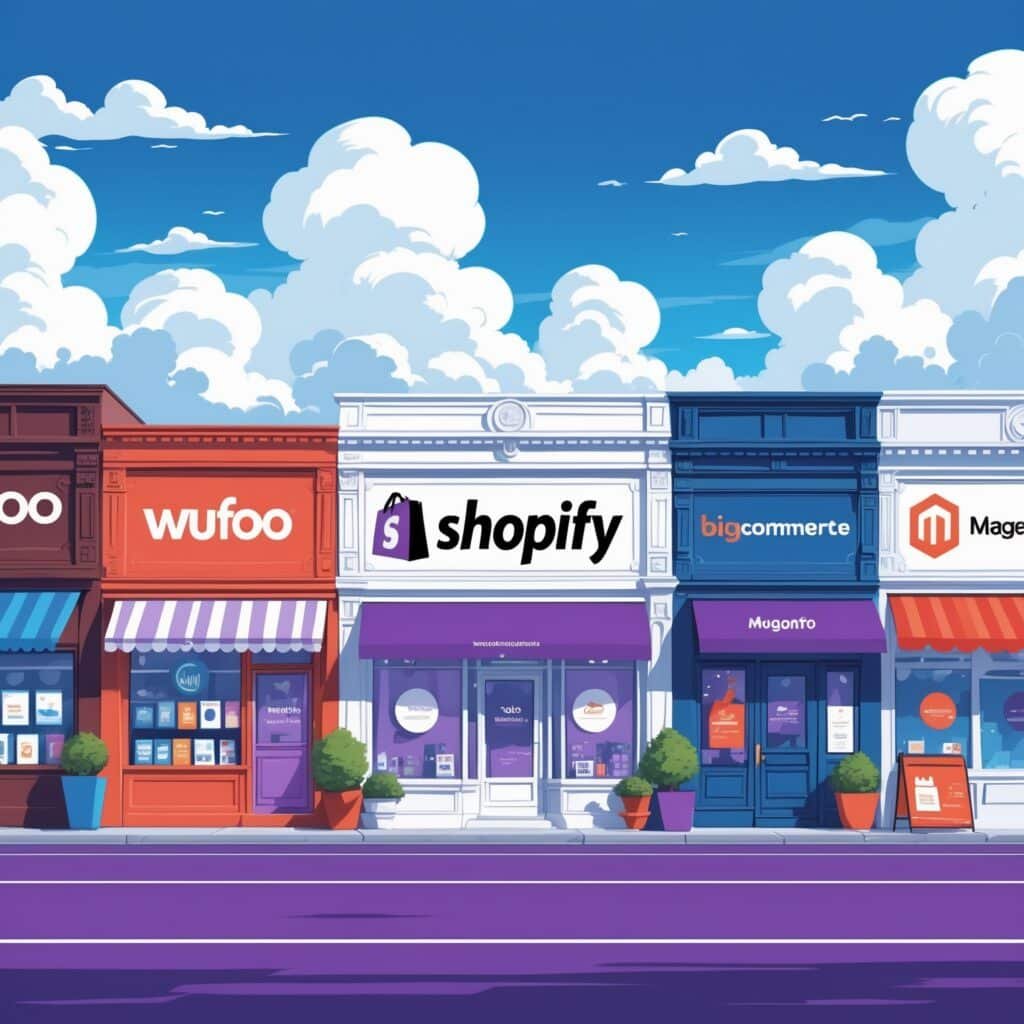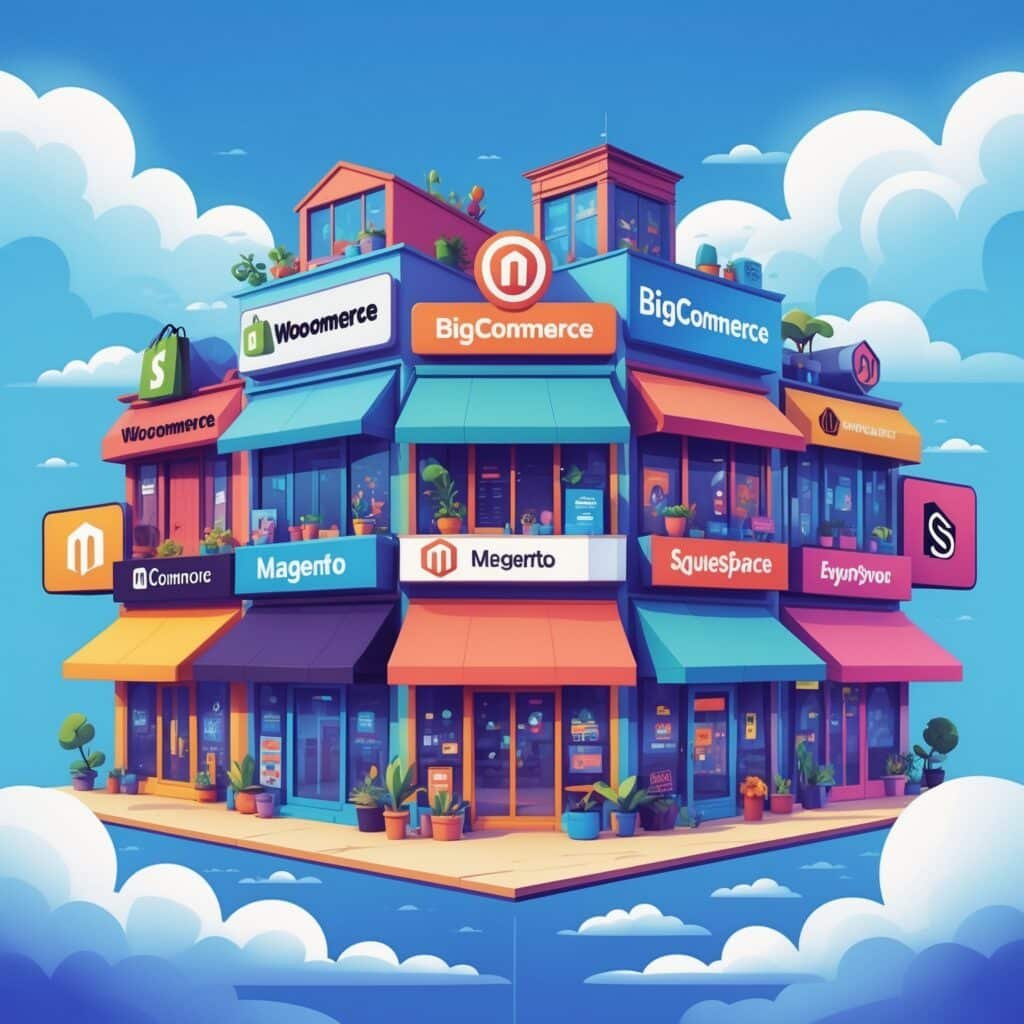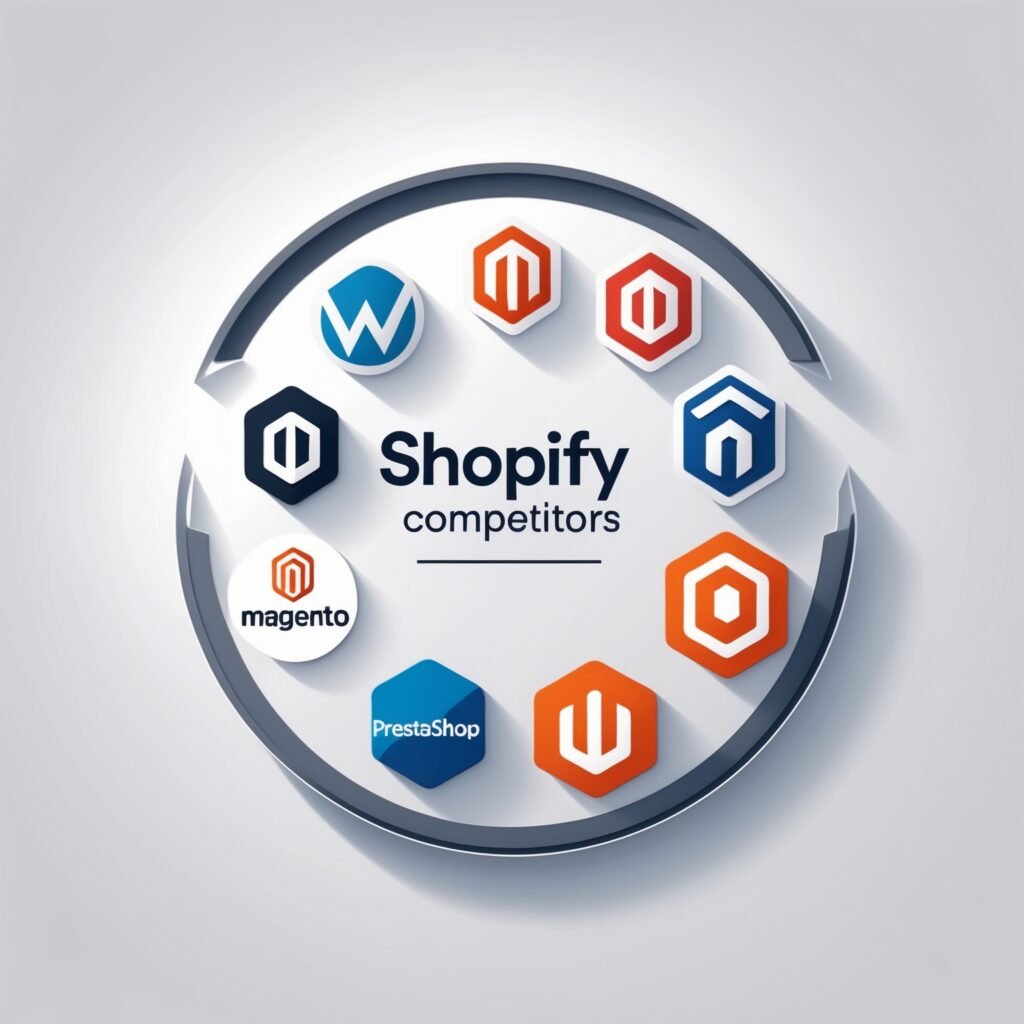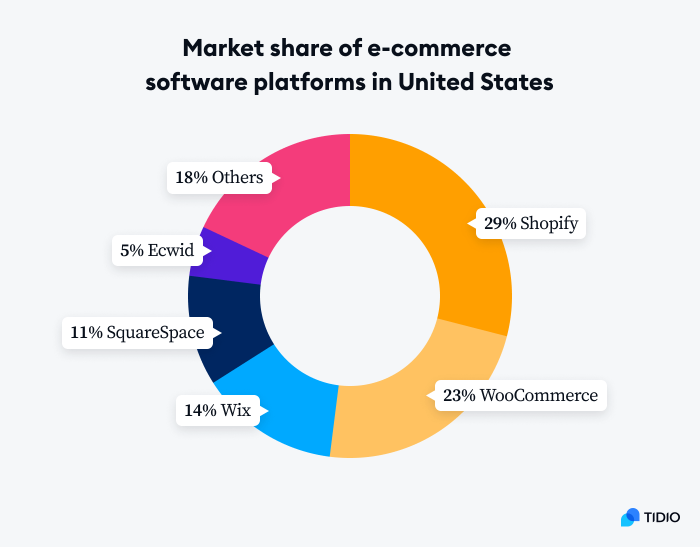E-commerce is booming, and Shopify stands out as a leading platform. But it’s not the only option.
Other platforms also offer unique features and benefits for online businesses. Choosing the right e-commerce platform is crucial for your business success. Shopify offers a comprehensive solution with tools for online and in-person sales. But depending on your needs, other platforms might be a better fit. Whether it’s cost, customization, or specific features, exploring Shopify competitors can help you make an informed decision. In this blog post, we’ll dive into the strengths and weaknesses of Shopify’s main competitors. This will help you find the perfect platform to grow your business. For those interested in Shopify, check it out here.

Introduction To Shopify And Its Market Position
Shopify is a leading commerce platform used by businesses worldwide. It enables users to create, customize, and manage online stores. Shopify also supports in-person sales. With its comprehensive tools, it has become a go-to solution for many.
Overview Of Shopify
Shopify offers a wide range of features to help businesses thrive. These include:
- Online Store Editor: Customize your store with various themes.
- Shopify App Store: Enhance your store’s functionality with business apps.
- Domains & Hosting: Own and manage your site domain.
- Point of Sale (POS): Sell in-person and sync offline and online sales.
- Multichannel Integration: Sell across various platforms and reach millions of shoppers.
- World-Class Checkout: Fast and customizable checkout process.
- Inventory & Order Management: Manage stock and orders efficiently.
- Shopify Fulfillment Network: Outsource fulfillment and returns.
- Analytics and Reporting: Track sales, orders, and performance metrics.
- Shopify Flow: Automate business processes.
- Shopify Finance: Manage finances and access funding.
- Shopify Developers: Build custom apps and storefronts with Shopify’s APIs.
Shopify is known for its ease of use. Businesses can start selling quickly with an intuitive setup process. It also offers scalability, allowing businesses to grow from small to enterprise-level. The platform’s global reach enables selling both locally and internationally with ease.
Why Consider Alternatives To Shopify
While Shopify is robust, it may not be the perfect fit for everyone. Some reasons to consider alternatives include:
- Cost: Shopify can be expensive for small businesses with limited budgets.
- Customization Limits: Some businesses may need more customization options than Shopify offers.
- Specific Needs: Certain industries may require specialized features not available on Shopify.
- Transaction Fees: Shopify charges transaction fees unless using Shopify Payments.
- Learning Curve: Despite its ease of use, some users may find it challenging to master.
Exploring alternatives can help find a platform that better fits specific business needs. Each platform has unique features and pricing models. This ensures a better match for diverse requirements.
Bigcommerce: A Comprehensive E-commerce Solution
BigCommerce stands as a strong competitor in the e-commerce space. It offers a robust platform for businesses looking to sell online. With a variety of features, competitive pricing, and both advantages and disadvantages, BigCommerce has carved a niche for itself.
Key Features Of Bigcommerce
BigCommerce comes packed with features that make it a comprehensive e-commerce solution:
- Customizable Templates: Beautiful, responsive templates to create unique online stores.
- SEO Tools: Advanced SEO features to help your store rank higher.
- Multichannel Selling: Sell across platforms like eBay, Amazon, and social media.
- Inventory Management: Efficiently manage stock with real-time updates.
- Payment Gateways: Integrate with multiple payment options including PayPal, Stripe, and Apple Pay.
- Analytics and Reporting: Detailed insights into sales and customer behaviors.
Pricing And Affordability Of Bigcommerce
BigCommerce offers several pricing plans to suit different business needs:
| Plan | Monthly Cost | Features |
|---|---|---|
| Standard | $29.95 | All essential tools for a growing business |
| Plus | $79.95 | Advanced marketing tools and customer segmentation |
| Pro | $299.95 | Google customer reviews and custom SSL |
| Enterprise | Custom pricing | Advanced features and priority support |
Pros And Cons Of Bigcommerce
Like any platform, BigCommerce has its strengths and weaknesses:
Pros:
- Highly customizable and scalable
- SEO-friendly features
- Supports multiple payment gateways
- Good customer support
Cons:
- Complex pricing structure
- Limited free themes
- Additional cost for advanced features

Wix Ecommerce: User-friendly And Versatile
Wix eCommerce stands out for its user-friendly interface and versatile features. It caters to small businesses and individual entrepreneurs. Wix provides a simple, drag-and-drop website builder, making it easy to create beautiful online stores without coding skills. Explore the key features, pricing, and pros and cons of Wix eCommerce to understand if it’s the right fit for your business.
Key Features Of Wix Ecommerce
- Drag-and-Drop Builder: Build your store easily with a simple drag-and-drop interface.
- Customizable Templates: Choose from hundreds of templates to match your brand.
- SEO Tools: Enhance your site’s visibility with built-in SEO tools.
- Mobile Optimization: Ensure your store looks great on any device.
- Secure Payments: Accept payments securely through various gateways.
- Inventory Management: Track stock levels and manage orders efficiently.
- Marketing Tools: Utilize email marketing, social media integrations, and more.
- App Market: Access additional functionalities through the Wix App Market.
Pricing And Affordability Of Wix Ecommerce
| Plan | Price (per month) | Features |
|---|---|---|
| Business Basic | $23 | Secure online payments, 20GB storage, and more. |
| Business Unlimited | $27 | Everything in Basic plus 35GB storage, and more. |
| Business VIP | $49 | Everything in Unlimited plus priority support. |
Pros And Cons Of Wix Ecommerce
Pros
- User-Friendly: Easy to use with a drag-and-drop builder.
- Customizable: Plenty of templates and design options.
- SEO Friendly: Built-in SEO tools to boost visibility.
- Affordable Plans: Competitive pricing with various plans.
- Mobile Optimization: Stores look great on any device.
Cons
- Limited Scalability: May not be suitable for very large stores.
- Transaction Fees: Charges transaction fees on payments.
- App Limitations: Some advanced features require third-party apps.

WooCommerce: Customizable And Scalable
WooCommerce is a leading competitor to Shopify, known for its high degree of customizability and scalability. This open-source platform is designed to integrate seamlessly with WordPress, offering businesses the flexibility to tailor their online stores to specific needs.
Key Features Of WooCommerce
WooCommerce boasts a range of powerful features that make it a popular choice for many online retailers.
- Open Source: Completely customizable with access to the source code.
- WordPress Integration: Seamlessly integrates with WordPress, offering extensive content management capabilities.
- Variety of Extensions: Access to hundreds of plugins and extensions to enhance functionality.
- Payment Gateways: Supports multiple payment options, including PayPal and Stripe.
- Inventory Management: Efficiently manage stock levels, orders, and customer data.
- SEO-Friendly: Built-in SEO features to help improve search engine rankings.
Pricing And Affordability Of WooCommerce
WooCommerce is free to download and use. However, there are costs associated with domain registration, hosting, and premium extensions. Below is a breakdown of potential costs:
| Item | Cost |
|---|---|
| Domain Registration | $10 – $15 per year |
| Web Hosting | $5 – $25 per month |
| Premium Extensions | Varies |
Pros And Cons Of WooCommerce
Pros:
- Highly Customizable: Modify every aspect of your store.
- Scalable: Grows with your business.
- SEO Benefits: Leverage WordPress’s powerful SEO capabilities.
- Community Support: Large community for troubleshooting and advice.
Cons:
- Technical Knowledge Required: May need coding skills for advanced customization.
- Additional Costs: Hosting, domain, and extensions can add up.
- Maintenance: Requires regular updates and security checks.
Squarespace: Elegant Design And Ease Of Use
Squarespace is known for its elegant design and ease of use. It offers a user-friendly interface, making it ideal for users who want to create visually appealing websites without needing technical skills.
Key Features Of Squarespace
- Templates: Squarespace offers a wide variety of professionally designed templates. These templates are customizable to fit any brand.
- Drag-and-Drop Editor: The platform features a drag-and-drop editor. This makes it easy to create and edit pages.
- Mobile Optimization: All templates are mobile-optimized. This ensures your site looks great on any device.
- SEO Tools: Squarespace provides built-in SEO tools. These help improve your site’s visibility on search engines.
- Integrated E-commerce: Squarespace includes e-commerce capabilities. You can sell products, manage inventory, and process payments directly from your site.
- Analytics: The platform offers detailed analytics. You can track your site’s performance and gain insights into visitor behavior.
Pricing And Affordability Of Squarespace
| Plan | Price per Month |
|---|---|
| Personal | $16 |
| Business | $26 |
| Basic Commerce | $30 |
| Advanced Commerce | $46 |
Squarespace offers four pricing plans. The Personal plan is $16 per month. The Business plan is $26 per month. For e-commerce, the Basic Commerce plan is $30 per month, and the Advanced Commerce plan is $46 per month.
Pros And Cons Of Squarespace
Pros:
- Beautiful and professional templates
- User-friendly drag-and-drop editor
- All-in-one platform with integrated e-commerce
- Strong mobile optimization
- Comprehensive SEO tools
Cons:
- Limited third-party app integrations
- Higher pricing compared to some competitors
- Less flexibility for advanced customizations
Squarespace stands out for its elegant design and ease of use. It offers beautiful templates and a user-friendly interface. However, it has limited third-party app integrations and higher pricing.
Magento: Robust And Flexible
Magento is a powerful eCommerce platform designed for flexibility and scalability. It is ideal for businesses that need a robust and customizable solution. Magento offers a wide range of features and integrations, making it a popular choice among growing businesses.
Key Features Of Magento
Magento comes with several key features that set it apart from other eCommerce platforms. Here are some of the most notable ones:
- Customizable Themes: Design your store with a variety of themes and templates.
- SEO Optimization: Built-in tools to improve search engine rankings.
- Product Management: Manage products, categories, and inventory with ease.
- Multi-Store Management: Operate multiple stores from a single admin panel.
- Mobile Commerce: Mobile-friendly design and features for better user experience.
- Advanced Reporting: Generate detailed reports on sales, customer behavior, and more.
- Third-Party Integrations: Integrate with various third-party applications and services.
Pricing And Affordability Of Magento
Magento offers several pricing options to cater to different business needs. Here is a breakdown:
| Plan | Cost | Features |
|---|---|---|
| Magento Open Source | Free | Basic features, community support |
| Magento Commerce | Starts at $22,000/year | Advanced features, 24/7 support, cloud hosting |
| Magento Commerce Cloud | Custom pricing | All Commerce features, cloud infrastructure, high scalability |
Pros And Cons Of Magento
Like any platform, Magento has its strengths and weaknesses. Here are some of the pros and cons:
Pros
- Highly Customizable: Tailor your store to meet specific business needs.
- Scalable: Suitable for businesses of all sizes, from small startups to large enterprises.
- Rich Feature Set: Comprehensive tools for managing and growing your store.
- Strong Community Support: Large community of developers and users.
Cons
- Complex Setup: Initial setup and customization can be challenging for beginners.
- Cost: Higher cost compared to other eCommerce platforms, especially for advanced plans.
- Resource Intensive: Requires significant server resources for optimal performance.

Shift4shop: Feature-rich And Cost-effective
Shift4Shop is a robust eCommerce platform offering numerous features at a competitive price. This makes it an attractive alternative to Shopify for businesses of all sizes.
Key Features Of Shift4shop
Shift4Shop comes equipped with a variety of tools to help businesses succeed online.
- Customizable Templates: Access a wide range of free and premium templates.
- SEO Tools: Built-in SEO features to improve search engine rankings.
- Product Management: Easily add, edit, and manage products.
- Payment Processing: Integrate multiple payment gateways.
- Marketing Tools: Use email marketing, social media integrations, and more.
- 24/7 Customer Support: Round-the-clock assistance via phone, chat, and email.
Pricing And Affordability Of Shift4shop
Shift4Shop offers various pricing plans to suit different business needs. Here’s a breakdown:
| Plan | Monthly Cost | Features |
|---|---|---|
| Startup | $29 | Basic features for small businesses |
| Basic | $79 | Includes more advanced tools |
| Plus | $129 | Enhanced features for growing businesses |
| Pro | $229 | All features with priority support |
Pros And Cons Of Shift4shop
Like any platform, Shift4Shop has its strengths and weaknesses.
Pros:
- Comprehensive feature set
- Competitive pricing
- Strong SEO tools
- Multiple payment options
Cons:
- Steeper learning curve for beginners
- Limited design customization

Credit: www.tidio.com
Volusion: Comprehensive And User-friendly
Volusion is a popular alternative to Shopify, known for its comprehensive features and user-friendly interface. It has been a trusted eCommerce platform for over two decades, providing businesses with the tools they need to succeed online.
Key Features Of Volusion
- Website Builder: An easy-to-use drag-and-drop builder for creating stunning online stores.
- Responsive Themes: A variety of customizable, mobile-friendly themes.
- Product Management: Efficient tools for managing inventory, including bulk import/export capabilities.
- SEO Tools: Built-in SEO features to help increase your store’s visibility on search engines.
- Payment Processing: Secure and flexible payment options, including credit card processing and PayPal integration.
- Marketing Tools: Email marketing, social media integration, and promotional tools.
- Analytics and Reporting: Detailed reports and analytics to track your store’s performance.
- 24/7 Support: Around-the-clock customer support to assist you with any issues.
Pricing And Affordability Of Volusion
| Plan | Cost | Features |
|---|---|---|
| Personal | $29/month | Up to 100 products, Online support, No transaction fees |
| Professional | $79/month | Up to 5000 products, Priority support, Advanced reports |
| Business | $299/month | Unlimited products, 3rd-party integrations, Dedicated account manager |
Pros And Cons Of Volusion
Pros:
- Comprehensive eCommerce features.
- User-friendly interface.
- Good SEO tools.
- No transaction fees.
- 24/7 customer support.
Cons:
- Limited design customization compared to some competitors.
- Transaction fees on some payment gateways.
- Higher cost for advanced features.
Volusion offers a solid, user-friendly platform with a range of features suitable for small to medium-sized businesses. Its comprehensive tools and excellent customer support make it a compelling choice for eCommerce entrepreneurs.
Conclusion: Finding The Right Shopify Alternative
Choosing the right eCommerce platform is essential for your business success. Shopify is a great option, but it may not fit every business model. Exploring its competitors can help you find the right match for your specific needs.
Recommendations Based On Business Needs
Different businesses have different requirements. Here are some recommendations based on common needs:
| Business Type | Recommended Platform | Key Features |
|---|---|---|
| Small Businesses | Wix | Easy setup, affordable plans, user-friendly |
| Medium to Large Enterprises | BigCommerce | Advanced features, scalability, robust integrations |
| Creative Professionals | Squarespace | Beautiful templates, easy customization, strong design tools |
| Global Sellers | WooCommerce | Highly customizable, extensive plugins, flexible |
Final Thoughts On Choosing The Best Platform
Ease of Use: If you need a platform that is easy to set up and manage, consider Wix or Squarespace. They offer user-friendly interfaces and quick setup processes.
Scalability: For businesses planning to grow, BigCommerce offers robust features and scalability. It is designed to support larger operations with advanced needs.
Customization: If customization is crucial, WooCommerce provides extensive plugins and flexibility. You can tailor your store to meet specific requirements.
Global Reach: For businesses aiming to sell internationally, Shopify and WooCommerce offer excellent tools to manage global sales. They support multiple currencies and languages.
Each platform has unique strengths. Assess your business needs carefully to choose the right one.

Credit: shopify-guide.net
Frequently Asked Questions
What Are The Top Shopify Alternatives?
BigCommerce, WooCommerce, and Magento are popular alternatives to Shopify.
How Does Bigcommerce Compare To Shopify?
BigCommerce offers more built-in features but can be more complex to use.
Is Woocommerce A Good Shopify Competitor?
Yes, WooCommerce is great for WordPress users who want flexibility and control.
What Makes Magento Different From Shopify?
Magento is open-source, allowing for more customization but requires technical skills.
Are There Any Free Shopify Competitors?
Yes, WooCommerce and PrestaShop offer free basic versions, but you may need to pay for add-ons.
How Does Squarespace Compare To Shopify?
Squarespace is simpler and better for content-heavy sites but has fewer e-commerce features.
Which Shopify Alternative Is Best For Small Businesses?
Wix is user-friendly, affordable, and great for small businesses with simple needs.
Conclusion
Exploring Shopify competitors helps find the best fit for your business. Each platform offers unique features and pricing. Understanding these options ensures informed decisions for your e-commerce needs. For a comprehensive solution, consider Shopify. It supports online and offline sales, making it a versatile choice. Start your journey with Shopify today and see the difference it can make for your business growth.

